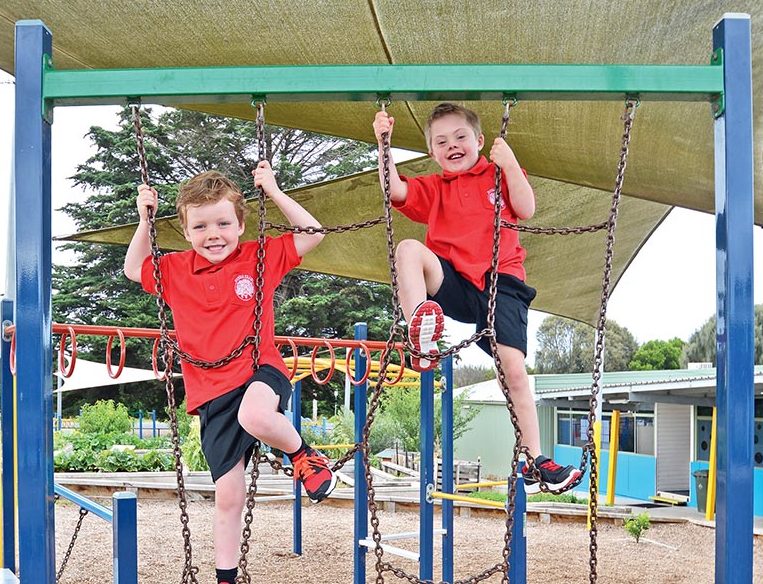One woman’s personal account of raising a child with down syndrome.
By MELISSA WALSH
‘Have you thought about special school?’ is not the question you are expecting when you first visit a local mainstream primary school for your child to attend. However, as Sarah Munn discovered, if you have a child with Trisomy 21, also known as down syndrome, it is a question that you get used to.
Sarah, who is an Occupational Therapist and the mother of two beautiful boys, runs Barefoot OT, an occupational therapy service for children based in Rosebud, offering OT across the peninsula.
“I have 2 children, Ike who is 6 and started mainstream prep this year – he has down syndrome, and Gus who is 5 and at kinder. He is gifted with autism spectrum disorder and ADHD,” says Sarah, who started her OT practice over two years ago when she discovered there were insufficient services available for her children.
“At that time all the OT’s had waiting lists. I now employ two other local OTs and we have recently opened a clinic in Rosebud. We are a bit different from other OT practices as we offer a community based service in homes, kinders and schools,” says Sarah.
Sarah says it is important to understand that it is your choice as parents if you want your child to attend mainstream schools.
“It is a fair question for children with additional needs and the specialist educational facilities provide much needed schools for the community. However, it is the choice of the parents if they want to attend mainstream schools and these schools should accept any child in their local area without the family feeling like they aren’t really wanted, so the question ‘have you thought of special school?’ is not really helpful when a family is looking around a local primary school,” she says. “There are usually a team of people who have been asking that question for years already. These children have been involved in services all their life. Of course families have thought about it. T21 is diagnosed in utero or in our case not long after birth – so it would not be possible to get to 5 and not have thought about if a special school might be needed.”
For Sarah and many other families, visiting special developmental schools and mainstream schools are part of the course when making the difficult decision.
“Words like inclusion and supportive are used freely, and yet not many educators know how to offer informed choice to families about what we are choosing and why, or how to establish inclusive environments which need to be both experiential and backed up by therapy,” says Sarah. “Many schools will tell us they have therapists at school, they will rarely confirm that your child will receive a significant amount of therapy while at school. Most families still source it privately.”
Sarah says that last year Ike started prep at Boneo Primary School which does understand inclusion, therapy and community.
“We have felt welcomed, supported and valued. Day one was a very big deal for us, one of the proudest feelings I will have was watching Ike line up in his uniform and glasses, with his heavy bag nearly toppling him backwards – it felt like the end point of years of occupational therapy, speech therapy and physio. Ike had done a school readiness group in preparation for the start of term and had spent his pre-school years in preparation for school. From birth we hoped he would learn to walk, talk and play. And he sure did. We read his social story book about his school every night of the holidays leading up to the start of prep. It was his favourite book. He couldn’t say his teacher’s name very well but would shout it happily around the house,” she says.
Funding for children with disabilities can be applied for through the education department, but it is a major issue for mainstream schools, so Sarah suggests, as a parent it is best to go in with your eyes open.
“There won’t be enough for what you think you need. However schools can be very creative in making sure the basics are covered (safety and involvement) and some schools also provide individual teaching time and therapy/learning time from an Aide too. Assessments and reports are needed from a psychologist and all your therapists in order for the application to be worthwhile. After you have sweated over your story with all your team and often a new psychologist, you get all the reports to read – it is heartbreaking to hear all the things your child cannot do. They need help with the toilet, the playground, the learning, the communication, the play, the snack – the list is endless. You cry once again for the difficult journey you have to complete. It is not a sad journey, but it is like taking a beautiful walk up a mountain, the experience and scenery and all the people you meet along the way are fantastic. The challenges, steep rocky areas and bad weather are all unimportant when you rest to watch a bird feeding on a flower or see the sun rise on the horizon like a smile on your child’s face. All I can say is, however beautiful, it is uphill, and you often feel like you are dragging a team behind you. Since the start of school I have felt like a team is pulling me up the hill for a change. Ike has new advocates and I can take a rest for a while. Parents should always feel most view ahead is bright.”


